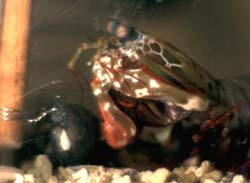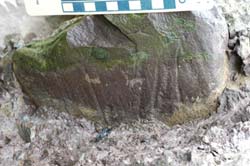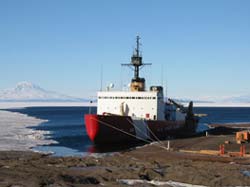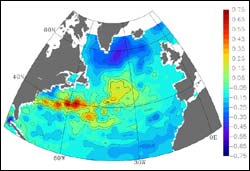
Saddle-shaped structure provides the spring to generate powerful punch
Forget boxers Oscar de la Hoya and Shane Mosley. The fastest punches are delivered by a lowly crustacean – the stomatopod, or mantis shrimp.
With the help of a BBC camera crew and the loan of a high-speed video camera, University of California, Berkeley, scientists have recorded the swiftest kick, and perhaps most brutal attack, of any predator. The shrimp flail their club-shaped front leg at peak speeds
The Arctic Ocean receives about 10 percent of Earth’s river water and with it some 25 teragrams [28 million tons] per year of dissolved organic carbon that had been held in far northern bogs and other soils.
Now an international team of U.S. and German scientists, including some funded by the National Science Foundation, have used carbon-14 dating techniques to determine that most of that carbon is fairly young and not likely to affect the balance of global climate.
They report

Glaciers reached Cape Cod, Massachusetts, in the most recent ice age about 20,000 years ago. But much harsher ice ages hit the Earth in an ancient geological interval known as “the Cryogenian Period” between 750 and 600 million years ago. A team of geologists from China and the United States now report evidence of at least three ice ages during that ancient time.
“The Cryogenian Period is characterized by some of the worst glaciations in earth history. But the available age constraints are s

Dumping iron in the ocean is known to spur the growth of plankton that remove carbon dioxide, a greenhouse gas, from the atmosphere, but a new study indicates iron fertilization may not be the quick fix to climate problems that some had hoped.
Scientists have quantified the transport of carbon from surface waters to the deep ocean in response to fertilizing the ocean with iron, an essential nutrient for marine plants, or phytoplankton. Prior work suggested that in some ocean regions

A North Atlantic Ocean circulation system weakened considerably in the late 1990s, compared to the 1970s and 1980s, according to a NASA study.
Sirpa Hakkinen, lead author and researcher at NASA’s Goddard Space Flight Center, Greenbelt, Md. and co-author Peter Rhines, an oceanographer at the University of Washington, Seattle, believe slowing of this ocean current is an indication of dramatic changes in the North Atlantic Ocean climate. The study’s results about the system tha

A remarkable expedition to the waters of Antarctica reveals that iron supply to the Southern Ocean may have controlled Earth’s climate during past ice ages. A multi-institutional group of scientists, led by Dr. Kenneth Coale of Moss Landing Marine Laboratories (MLML) and Dr. Ken Johnson of the Monterey Bay Aquarium Research Institute (MBARI), fertilized two key areas of the Southern Ocean with trace amounts of iron. Their goal was to observe the growth and fate of microscopic marine plants (phytopla